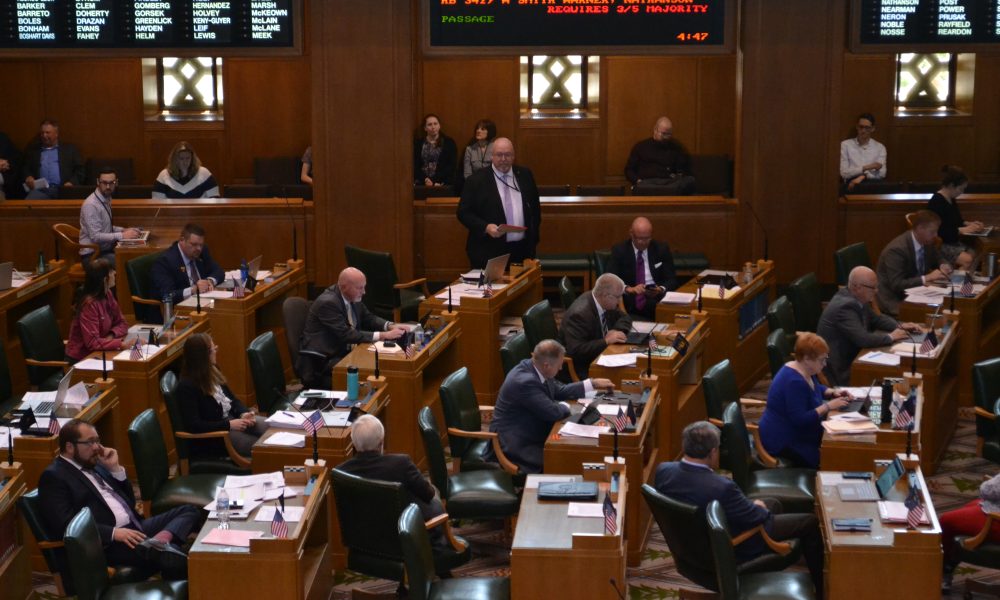
Lawmakers talk with each other and fiddle with their phones and computers during the long hearing, stretching past 5 p.m. (Claire Withycombe/EO Media Group)
The Student Success Act, a tax bill to pay for ambitious education reforms, passed the Oregon House Wednesday.
Hours of debate and deliberation ended when the House passed the measure on a 37-21 vote.
Democrats took to the floor to talk about how the state has ignored issues like education for too many years. It’s time to fix our failing system, they said.
Republicans said the tax proposal will hurt rural and working class Oregonians. The proposal is being rushed and is ignoring the will of the voters, they argued.
The votes were likely counted before the floor session started at 11 a.m., but that didn’t stop the hearing from stretching to nearly six and a half hours.
It started when Republicans suspended standard protocol. That move meant the clerk had to read the 45-page bill aloud, which took about two and a half hours.
After, lawmakers gave drawn out speeches repeating many of the same points.
Both are tactics House Republicans have leaned into lately, as the session enters its last two months and they feel steamrolled by large Democrat majorities.
But Democrats showed no interest in brevity either.
But in the end, the bill passed as expected, on a party line vote.
Under the bill, businesses would pay a tax of about half a percent on gross sales in Oregon over $1 million.
Businesses can deduct 35 percent of either labor or production costs. The deal came together Monday, shortly before HB 3427 passed out of committee.
The proposal was born out of a bipartisan, bicameral committee that toured the state to find out what ails Oregon’s education system.
Lawmakers found large classrooms and tight budgets. They found homeless and hungry students. They found too few resources going to early learning and mental health.
“The bill before you is the policy response for what we heard and saw throughout the state,” Rep. Barbara Smith Warner, D-Portland, said in her opening speech.
Despite those efforts, the bill still brought a strong partisan divide.
Republicans said this is a “hidden sales tax,” a resurrection of a similar tax proposed on the ballot in 2016.
They said it will hurt businesses, and the tax will be passed on to consumers.
Rep. Daniel Bonham, R-The Dalles, said it’s “unaffordable, ineffective and lacks transparency,” much like the rest of the legislative session, he said.
While the bill provides funding that must be spent on education, many Republicans said the plan just opens the door for general fund money currently going to education to be diverted to pay for the ballooning debt in the state’s public employee pension system.
Rep. David Brock Smith called that the “$26 billion gorilla” not being addressed.
Others, like Rep. Shelly Boshart Davis, R-Albany, said this will encourage Oregon businesses to export products out of the state to avoid the new tax.
That could mean doomsday for your locally grown broccoli, said Boshart Davis.
“We’ll see more broccoli coming from Mexico, rather than outside of Salem,” she said.
She, and others like House Republican Leader Carl Wilson, R-Grants Pass, said Republicans were shut out of the process. They wanted to send the bill back to committee to get more Republican input.
But Rep. Greg Smith, R-Heppner, who sat on the Joint Committee on Student Success, joked his input was asked for almost too often.
“The notion that I have not been able to participate is simply not accurate,” he said.
Still, Smith voted against the bill. With a Republican and Democrat absent, the bill got one more than the 36 votes it needed to pass.
It now goes to the Senate.
Reporter Aubrey Wieber: [email protected] or 503-575-1251. Wieber is a reporter for Salem Reporter who works for the Oregon Capital Bureau, a collaboration of EO Media Group, the Pamplin Media Group, and Salem Reporter.
For the latest news, follow the Enterprise on Facebook and Twitter.
TRY A FREE SAMPLE – You can see for yourself the kind of local news reporting produced by the Malheur Enterprise with a news team focused exclusively on news that’s important to you. You can read us for free for 30 days. Signing up is easy and then you have 24/7 access to our reports. Sign up HERE. Or you can support some of the nation’s best journalism by subscribing to our digital news service for $5 a month, easy and automatic. Subscribe HERE.




